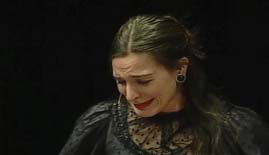Teachers' Domain - Digital Media for the Classroom and Professional Development
User: Preview



John Basil, founding member of the American Globe Theatre in New York City, directed graduate students from Penn State's School of Theatre in this production of selected scenes from William Shakespeare's Twelfth Night during Penn State's 2007 theatre season.
Jennifer Evans, Josie Gildow, and Gary Masquelier, English teachers from central Pennsylvania, wrote lesson plans based on these video segments.

In this video from Penn State's School of Theatre production of Twelfth Night, Viola enters Olivia’s garden dressed as Cesario to carry out Orsino’s errand. Sir Toby and Sir Andrew arrive in the garden behaving foolishly; Toby invites Cesario into the house. Olivia comes down to the garden accompanied by her servant Maria. Olivia is very excited to see Cesario and anxious to hear what he has to say. When they are alone, she tells Cesario that she is completely in love with him. Uncomfortably, Cesario tries to tell Olivia that she does not really love him as he is.
Feste, the fool, is seen as the wise professional that he is. He knows how to entertain people as is evident by the various devices he employs for different characters. For Orsino, he sings a sad little ditty that pleases his mind, while with Sir Toby and Sir Andrew, he participates in a drunken ‘catch’. For Viola, he uses puns. Viola calls him wise, thus adding to the ironies strewn throughout the play. No character acts as he or she should. The fool, of all the people, should not be a wise man.
This scene also has Olivia confessing her love to Viola and Viola trying to fight her off. It is amusing to see both Orsino and Olivia trying to woo someone who wants nothing to do with him or her. But Olivia is not a Petrarchan lover like Orsino. She is smitten by Cesario and she fully intends to have him, even forgetting her vow of celibacy for seven years! This is another irony that she breaks her vow (raising doubts about her resolve) only to fall in love with the wrong man. Viola cannot tell her the truth, but she takes pity on the lady for falling in love with a ‘man’ who could never return her affections. She does, however, tell her in no uncertain words that ‘he’ will never give his heart to a woman.
(Lines 120-121) Have you not set mine honor at the stake And baited it with all th’ unmuzzled thoughts That tyrannous heart can think?
Olivia is accusing Cesario of viciously teasing her by using the metaphor to the Elizabethan sport of bearbaiting. Here a bear was tied to a stake and harassed by savage dogs. Olivia is distraught that the “man” she loves is coming to woo her for another. (Oddly, it is interesting to note that Shakespeare’s theatre performances were rivaled for attendance by the local bear baiting star Harry Hunks.)
(Lines 61-62)This fellow is wise enough to play the fool, And to do that well craves a kind of wit.
(Lines 67-69) This is a practice as full of labor as a wise man’s art; For folly that he wisely shows, is fit; But wise men, folly-fall’n, quite taint their wit.
How do these lines by Viola continue the message that the entire play is based on folly and false wit?
How do these lines also show that Feste, thought the fool, is also quite intelligent?
 Loading Standards
Loading Standards